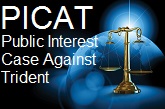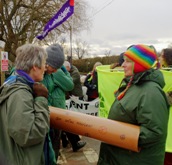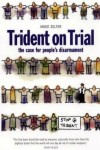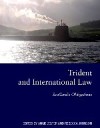by Kaye Stearman of CAAT.
Campaign Against Arms Trade (CAAT) works to end the international arms trade. The arms business has a devastating impact on human rights and security, and damages economic development. Large scale military procurement and arms exports only reinforce a militaristic approach to international problems
A global business
The arms business is a global one, reaching across borders and affecting people’s lives thousands of miles away. While the USA has by far the world’s largest arms industry, the UK remains a major manufacturer and exporter of weapons. It is home to one of the world’s largest arms companies, BAE Systems, as well as other significant players, such as Rolls-Royce, Cobham. QinetiQ, GKN and Chemring.
In addition, non-UK arms companies play a significant role; Italian arm giant Finmeccanica owns Agusta Westland helicopters, and Lockheed Martin, Thales and EADS have substantial businesses based in the UK.
Arms companies, nuclear weapons and the military establishment go hand in hand. Take BAE Systems as an example. One of its proudest boasts is that it is building a new generation of Astute class nuclear-powered attack submarines for the Royal Navy at its shipyards in Barrow-in-Furness. While BAE routinely showcases the submarines as a triumph for British technology and innovation, the programme has consistently run late and over budget, a cost that is paid by the taxpayer.
BAE is heavily involved in the development of the Trident replacement submarines, even though supposedly no decision has yet been made on Trident. In May 2012, BAE was handed the lion’s share of an MoD contract worth £350 million to build the next generation of nuclear armed Sucessor submarines, which will replace the Vanguard submarines which currently carry Trident.
BAE is not the only arms company working on the nuclear submarine programme. Rolls-Royce engines and Thales sensors are used in construction. Babcock International Group, the largest supplier of services to the Ministry of Defence, is involved in the construction of both the Astute and Vanguard nuclear submarines. Each Vanguard has the capacity to carry 16 Trident missiles, manufactured by American arms giant Lockheed Martin, containing up to 192 nuclear warheads (currently 48 warheads). Rolls-Royce and Babcock also share in the new Sucessor submarine contract.
In September 2012, BAE proposed to merge with EADS, whose military interests include manufacturing Eurofighter military helicopters and military transport aircraft, to form the world’s largest arms and military services company. A few weeks later, the merger collapsed. However, the two companies were already collaborating in some areas and will continue to do so, most prominently in the enormously expensive Eurofighter Typhoon project and MBDA Missiles.
MBDA Missiles
BAE and EADS each owns 37.5% of MBDA Missiles, with Italian weapons manufacturer Finmeccanica holding a further 25%. The name MBDA is not well known yet it is the second largest manufacturer of a wide range of guided missiles, both conventionally armed and nuclear, for Eurofighter, Gripen and Rafale aircraft. It has long been responsible for supplying France’s nuclear missile programme.
One country that bought MBDA Missiles was Colonel Gadaffi’s Libya who agreed to buy 1,000 Milan anti-tank missiles for €168 million in August 2007. The deal was agreed soon after then Prime Minister Tony Blair, accompanied by Guy Griffiths of BAE/MBDA, visited Libya and signed an “Accord on a Defence Cooperation and Defence Industrial Partnership”.
In 2011 UK forces were using MBDA Brimstone missiles in air strikes against the Gaddafi regime. By 2012 MBDA was rejoicing at a full order book from the Royal Air Force to replace the depleted missiles. Meanwhile, UK Trade & Investment Defence and Security Organization (the government’s arms sales body) was organising a new arms trade mission to Libya.
Justifications
How does the government justify their involvement in such danerous and controversial activities , such as arming repressive regimes or facilitating a nuclear threat? Usually they cite two factors – national security and employment.
The government, the military and the arms industry defines “national security” in narrow military terms. It sees the answer to external threats, however unspecific or distant, as increasing military numbers, weaponry and/or reach. Yet even the government’s 2010 Strategic Defence and Security Review sees conventional military threats as much less likely than non-military ones,. It identifies major “Tier 1” threats as natural disasters, international terrorism, cyber attacks and an international military crisis between states drawing in the UK and other parties. Yet, the stated response of the review is to “project power” through military might.
As for protecting British jobs, the numbers of jobs in the arms and related nuclear industry have been declining for many years and will continue to do so. Most of the arms industry workers will find their skills and expertise in high demand in other industries, including renewables. Even if other employment is not readily available (and it nearly always is), the idea that government should subsidise the arms industry in order to provide employment is wasteful in the extreme.
Former Lib Dem defence minister Nick Harvey recently commented: “The idea that you should produce weapons of mass destruction in order to keep 1,500 jobs going in the Barrow shipyard is palpably ludicrous. We could give them all a couple of million quid and send them to the Bahamas for the rest of their lives, and the world would be a much better place, and we would have saved a lot of money.”
Military spending in western countries is in decline, even though it is still far too high and has so far escaped the harshest budget cuts. Rather we should go further – cancelling the Trident replacement, stopping government subsidies to arms companies and directing investment towards more useful and beneficial technologies, such as renewables. Such moves would enhance our national security and provide a stable base for creating new jobs and industries.
Further information at Campaign Against Arms Trade (CAAT): www..caat.org.uk












 Nuclear weapons crime in the UK has been reported to Thames Valley Police.
Nuclear weapons crime in the UK has been reported to Thames Valley Police.










